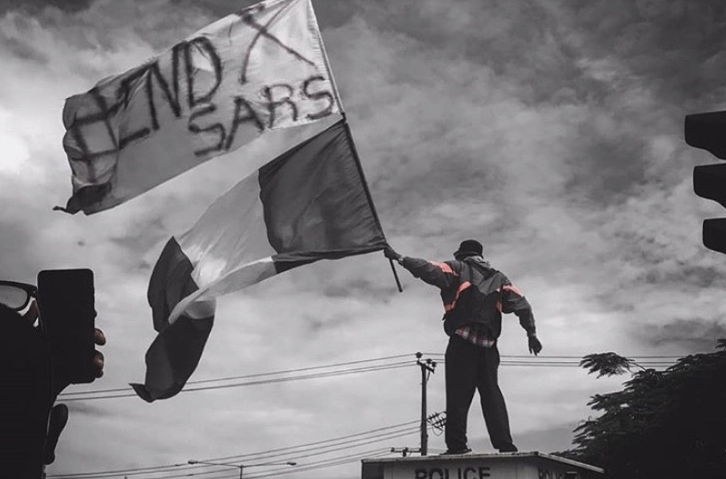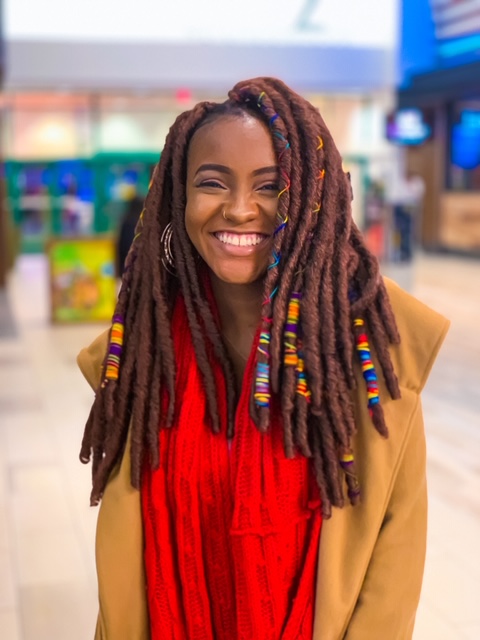Content Note: I wrote this as someone who identifies as a Nigerian-American. I wanted to share the parallels between those two parts of my identities. The blog explores police brutality occurring in Nigeria with specific focus on the events that occurred on October 20, 2020. The following may be triggering for some, as it contains descriptions and images of violence
 Photo Credit: This is a viral image of the protests, found on social media. The original source is unknown.
Photo Credit: This is a viral image of the protests, found on social media. The original source is unknown.
What is SARS?
I was going to write a different kind of blog, one that told anyone who had not heard about the Special Anti-Robbery Squad (SARS) or the protests going on in Nigeria, what it was. In fact, I had written a full page already, but something told me it was inadequate.
As a staff member of the Women’s Center, I wanted to write about how women have led and organized peaceful protests around the country, how they organized food, legal aid and medical care for people who had been shot at, arrested or needed sustenance during protests. I had wanted to write about how Nigerians managed to raise 4 million naira in two days to get a prosthetic for a disabled woman who had walked with everyone to protest. I wanted to explore how that had started a conversation on how the Nigerian government had failed its disabled population, but the new generation of Nigerians were not going to do the same. I wanted to tell you how Muslims and Christians had hugged and walked together for a common cause.
I wanted to tell you how inspired I was by my peers, by my people, and I still am, but today I am angry. I am hurt. I am tired. So, If you have not heard about the movement to end (SARS), here is an Instagram post that gives a run-down on how and why the protests started:
The Night that Cost Many Their Lives
As of October 20, 2020 (when I first began writing this blog post), the Lagos state governor of Nigeria imposed a 24-hour curfew on its citizens beginning at 4pm. The government then proceeded to remove all Close Circuit Televisions (CCTVs) at a popular protest point called the Lekki toll gate. Many people could not get back home in time for the curfew as the curfew was announced only four hours before it was to commence. In a city like Lagos, with its traffic and congestion, it was definitely guaranteed that not everyone could go home in time. So, some protestors decided to stay at the toll gate, seated on the floor arms locked, with their Nigerian flags waving. They were going to sleep there, as many had done in the past week and a half, but this time, they were not safe.
When it turned dark, the toll gate lights were shut off, and the Nigerian army opened fire on these people. They opened fire on civilians. They opened fire on unarmed civilians. They opened fire on Nigerians who were just asking for their rights to be respected. They opened fire while the world watched on Twitter and Instagram. The world watched as protesters huddled together and tried to save the leg of a protester who had been shot. The world watched as they tried to dig a bullet from his leg using phone torch lights to see in the dark. The world watched as people were killed in cold blood. Actually, I should say the president of Nigeria watched.
When I was kid, I was told the reason Nigeria did not have a red color on its flag was because our fight for independence was peaceful. I was told it was because no blood was shed for Nigerians to get their independence from the British. Today, there is red on that green white green. Today the Nigerian flag is stained red with the blood of its people. They came out to protest against police brutality. They came out to protest against the killing of their brothers and sisters by the Nigerian police and they were gunned down by the people meant to fight their wars – the Nigerian Army. And, while I am angry, I am also scared. I am terrified for my people. I am terrified because I have friends in Nigeria. I am terrified because I have family in Nigeria.
How Tragedy Brought People Together
I have seen videos of protestors singing the national anthem while they were being shot at. One could hear the fear in the voice of the man recording as he sang with everyone. I have seen a video of a man waving the national flag while he was in pain from being shot by the Nigerian army. I have seen hotels open their doors to protestors who were stranded and running from the shooting. I have seen hospitals open their doors to treat victims of the shooting for free. So as I am terrified by the evil in humanity, I am also inspired by the good in it. The bravery and the resilience of Nigerians, of Black people despite recent events, awe me.
Connecting Global Movements
On October 20, 2020, Nigeria stopped being a Democracy because, to me, no legitimate democratic government would allow its people to be shot dead on its streets.
As someone who now lives in the United States, I can’t help but also connect what’s happening in Nigeria to the Black Lives Matter movement happening in the United States. This movement is also rooted in police brutality against Black bodies. I ask myself, is anywhere safe for Black people? The people of my race are still dying, when their only crime is living.
The Power of Women
So yes, I applaud organizations like the Feminist Coalition, who helped gather donations for protestors, and families of the protestors, who have lost their lives in the fight. I applaud women, like Aisha Yesufu, who has bravely led her people in the fight against police brutality, and whose picture is one of the most popular ones from the movement (see image below). Women like Moe Dele who led a group of lawyers going to police stations in different states to free protestors, who had been unlawfully arrested. Women like Feyikemi Abudu, who while being a part of the Feminist Coalition, has helped create a help line for protestors who need medical help, legal aid, or funding to create a protest anywhere around the country. I applaud them for showing how powerful women are.
The Power of the People
I also believe the real applause goes to the people. The people who have been on the streets, the people who have risked their lives, the people who died today at the Lekki Toll Gate Massacre, the people who have been dying throughout the past two weeks. The people whose death sparked these protests. I see you. The world sees you. Your efforts will not be forgotten.
If you are reading this and you are someone who prays, I implore you to pray for Nigeria, pray for a country that bleeds. If you are not, please send out all the positive energy and thoughts you can send towards Nigeria, and Nigerians. Lastly to all the Nigerians of the UMBC community you can go to UMBC’s statement related to the protests so that you may access resources to help you cope with the situation.
There are so many injustices happening around the world (Namibia, Congo, Cameroon, Armenia to name only a few) and sometimes the whole mountain of it can be depressing. The one thing we have to remember is to keep fighting against injustice and oppression and that our movements are connected. We must think globally and act locally.
To learn more about this critical issues and to keep up with movement here or in Nigeria, here are some social media accounts you may want to follow:
- @endsarsdmv (Instagram)
- @endsarsnyc (Instagram)
- @officialendsarsresponse (Instagram)
- @savvyrinu (Twitter)
- @Aishayesufu (Twitter)






